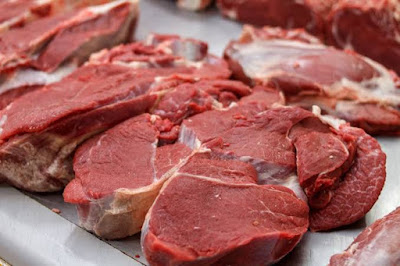Red Meat: The Sweet Deadly Protein.
their first choice source of animal protein which have led to the high Consumption of red meat especially in developing
countries and despite the nutritional benefits of red meat it's consumption has been linked to number of diseases and ailments so this article will be looking at the benefits and downside of red meat consumption.
BENEFITS.
countries and despite the nutritional benefits of red meat it's consumption has been linked to number of diseases and ailments so this article will be looking at the benefits and downside of red meat consumption.
BENEFITS.
Red meat is long established as an important dietary source of protein its amino acid profile being almost identical to that of your own muscles.
Other essential nutrients includes iron, zinc and vitamin B12,
It also contains range of fats including essential omega 3 polyunsaturated fats, although nutritional composition varies according to breed and feeding methods
Animal protein is usually of high quality, containing all nine essential amino acids needed for the growth and maintenance of your body
As the building blocks of proteins, amino acids are very important from a health perspective. Their composition in proteins varies widely, depending on the dietary source.
For this reason, eating meat — or other sources of animal protein — may be of particular benefit after surgery and for recovering athletes. In combination with strength exercise, it also helps maintain and build muscle mass
A few studies indicate that meat can increase the absorption of non-heme iron even in meals that contain phytic acid, an inhibitor of iron absorption.
Another study found that meat supplements were more effective than iron tablets at maintaining iron status in women during a period of exercise.
Therefore, eating meat is one of the best ways to prevent iron deficiency anemia.
DOWNSIDES
Beef contains varying amounts of fat — also called beef tallow.
Apart from adding flavor, fat increases the calorie content of meat considerably.
The amount of fat in beef depends on the level of trimming and the animal's age, breed, gender, and feed.
Beef and heart disease
Heart disease is the world's most common cause of premature death.
It’s a term for various conditions related to the heart and blood vessels, such as heart attacks, strokes, and high blood pressure.
Observational studies on red meat and heart disease provide mixed results.
Some studies detect an increased risk for both unprocessed and processed red meat, a few showed an increased risk for processed meat only, and others reported no significant association at all
Keep in mind that observational studies cannot prove cause and effect. They only show that meat eaters are either more or less likely to get a disease.
It’s possible that meat consumption is just a marker for unhealthy behavior, but negative health effects are not caused by the meat itself.
Additionally, people who eat meat are more likely to be overweight and less likely to exercise or eat a lot of fruits, vegetables,
Saturated fat and heart disease
Several theories have been proposed to explain the link between meat consumption and heart disease.
The most popular is the diet-heart hypothesis — the idea that saturated fat increases your risk of heart disease by raising cholesterol levels in your blood.
Still, most health authorities advise people to limit their intake of saturated fat — including beef tallow.
Many observational studies link high meat consumption to an increased risk of colon cancer — but not all studies find a significant association
Several components of red meat have been discussed as possible culprits:
Heme iron. Some researchers propose that heme iron may be responsible for the cancer-causing effect of red meat
Heterocyclic amines. These are a class of cancer-causing substances, produced when meat is overcooked
Other substances. It has been suggested that other compounds added to processed meats or formed during curing and smoking may cause cancer.
Heterocyclic amines are a family of carcinogenic substances formed during high-temperature cooking of animal protein, particularly when frying, baking, or grilling.
They’re found in well-done and overcooked meat, poultry, and fish
These substances may partly explain the link between red meat and cancer.
A large number of studies indicate that eating well-done meat — or other dietary sources of heterocyclic amines — may increase your risk of various cancers
These include colon, breast, and prostate cancer
One of these studies found that women who ate well-done meat regularly had a 4.6-fold increased risk of breast cancer
Taken together, some evidence suggests that eating high amounts of well-done meat may increase your risk of cancer.
Still, it’s not entirely clear whether it’s specifically due to heterocyclic amines or other substances formed during high-temperature cooking.
SUMMARY
High consumption of overcooked meat may increase the risk of several types of cancer.
Other downsides
Beef has been linked to a few adverse health conditions — other than heart disease and cancer.
Beef tapeworm
The beef tapeworm (Taenia saginata) is an intestinal parasite that can sometimes reach a length of 13–33 feet
It’s rare in most developed countries but relatively common in Latin America, Africa, Eastern Europe, and Asia.
Consumption of raw or undercooked (rare) beef is the most common route of infection.
Beef tapeworm infection — or taeniasis — usually doesn’t cause symptoms. However, severe infection may result in weight loss, abdominal pain, and nausea (76Trusted Source).
Iron overload
Beef is one of the richest dietary sources of iron.
In some people, eating iron-rich foods may cause a condition known as iron overload.
The most common cause of iron overload is hereditary hemochromatosis, a genetic disorder characterized by excessive absorption of iron from food
Excessive iron accumulation in your body can be life-threatening, leading to cancer, heart disease, and liver problems.
People with hemochromatosis should limit their consumption of red meat, such as beef and lamb
References
https://www.diabetes.co.uk/food/red-meat.html
https://theeagleonline.com.ng/control-consumption-of-red-meat-expert-tells-nigerians/#:~:text=%E2%80%9CThe%20harmful%20effects%20of%20red,with%20increased%20blood%20cholesterol%20levels.
https://www.healthline.com/nutrition/is-red-meat-bad-for-you-or-good#section3
https://www.researchgate.net/publication/307857504_Potential_health_hazards_of_eating_red_meat
https://www.medicalnewstoday.com/articles/326156
References
https://www.diabetes.co.uk/food/red-meat.html
https://theeagleonline.com.ng/control-consumption-of-red-meat-expert-tells-nigerians/#:~:text=%E2%80%9CThe%20harmful%20effects%20of%20red,with%20increased%20blood%20cholesterol%20levels.
https://www.healthline.com/nutrition/is-red-meat-bad-for-you-or-good#section3
https://www.researchgate.net/publication/307857504_Potential_health_hazards_of_eating_red_meat
https://www.medicalnewstoday.com/articles/326156




Comments
Post a Comment